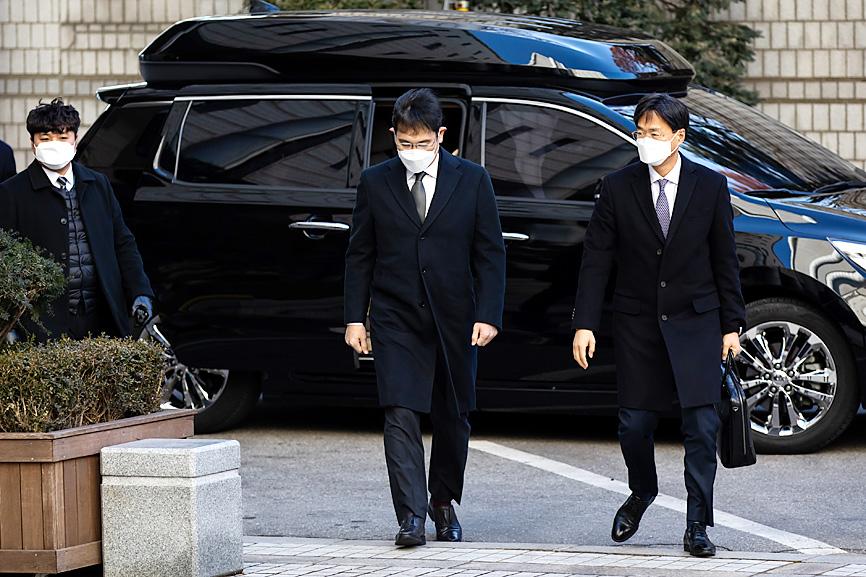South Korean prosecutors yesterday requested a nine-year prison term for Samsung Group chairman Jay Y. Lee, seeking to put the heir apparent back in jail in a bribery case that rocked the nation and ignited a backlash against its most powerful conglomerates.
Special prosecutors proposed the sentence during a hearing at the Seoul High Court, which is to make its ruling in the next few months.
“There’s no denying that it has made a lot of positive impact on our society, but just because there’s been an economic contribution, there should be no hesitation in legal enforcement based on the rule of law,” a transcript of closing arguments from prosecutors said, referring to Samsung.

Photo: Bloomberg
The 52-year-old billionaire is fighting allegations of graft in a retrial of a case that started four years ago, and led to his imprisonment and the ouster of former South Korean president Park Geun-hye.
The outcome of the case could snarl succession at Samsung Electronics Co, just as Lee is expected to formally take the helm of the mobile and electronics giant after the death of his father in October.
The executive stands accused of making gifts to cement his control over the world’s largest smartphone maker and smooth his ascension.
Lee served a year in jail before his release in 2018 after an initial five-year prison term was halved and suspended by an appeals court.
However, in August, the Supreme Court voided that decision, thrusting the executive back before a judge.
Lee faced a tougher sentence this time — a minimum of five years — because the amount of alleged bribery acknowledged by the top court increased.
Yet experts viewed a decreasing chance of imprisonment as the trial drew to a close.
Judges at the high court asked Samsung and Lee to impose measures to prevent illegal activity, and improve credibility among the group.
Lee responded by setting up an independent compliance committee and issuing a personal apology in May over past wrongdoings related to the succession process.
He also pledged publicly not to hand down leadership of South Korea’s largest conglomerate to his children.
The compliance committee’s activities are to be factored into Lee’s eventual sentencing.
The bribery allegations stem from a merger in 2015 between two Samsung units that helped Lee gain control over the group.
Prosecutors argued that Samsung offered horses and financial contributions, via an intermediary, to a confidante of Park to try and win the government’s support for the deal.
Lee, who stepped down from an internal director post, remains Samsung Electronics’ vice chairman and de facto leader.
Although his father and company chairman, Lee Kun-hee, died in October, the Samsung scion has not been immediately crowned his successor.
Samsung Electronics is likely to hold off on naming him to that role at least until the trial is completed.
Separately, Jay Lee is embroiled in another trial related to the 2015 merger, with allegations ranging from contraventions of capital market laws to breach of duty.
Prosecutors in September indicted Jay Lee and hearings are set to resume on Jan. 14.

Real estate agent and property developer JSL Construction & Development Co (愛山林) led the average compensation rankings among companies listed on the Taiwan Stock Exchange (TWSE) last year, while contract chipmaker Taiwan Semiconductor Manufacturing Co (TSMC, 台積電) finished 14th. JSL Construction paid its employees total average compensation of NT$4.78 million (US$159,701), down 13.5 percent from a year earlier, but still ahead of the most profitable listed tech giants, including TSMC, TWSE data showed. Last year, the average compensation (which includes salary, overtime, bonuses and allowances) paid by TSMC rose 21.6 percent to reach about NT$3.33 million, lifting its ranking by 10 notches

Popular vape brands such as Geek Bar might get more expensive in the US — if you can find them at all. Shipments of vapes from China to the US ground to a near halt last month from a year ago, official data showed, hit by US President Donald Trump’s tariffs and a crackdown on unauthorized e-cigarettes in the world’s biggest market for smoking alternatives. That includes Geek Bar, a brand of flavored vapes that is not authorized to sell in the US, but which had been widely available due to porous import controls. One retailer, who asked not to be named, because

SEASONAL WEAKNESS: The combined revenue of the top 10 foundries fell 5.4%, but rush orders and China’s subsidies partially offset slowing demand Taiwan Semiconductor Manufacturing Co (TSMC, 台積電) further solidified its dominance in the global wafer foundry business in the first quarter of this year, remaining far ahead of its closest rival, Samsung Electronics Co, TrendForce Corp (集邦科技) said yesterday. TSMC posted US$25.52 billion in sales in the January-to-March period, down 5 percent from the previous quarter, but its market share rose from 67.1 percent the previous quarter to 67.6 percent, TrendForce said in a report. While smartphone-related wafer shipments declined in the first quarter due to seasonal factors, solid demand for artificial intelligence (AI) and high-performance computing (HPC) devices and urgent TV-related orders

MINERAL DIPLOMACY: The Chinese commerce ministry said it approved applications for the export of rare earths in a move that could help ease US-China trade tensions Chinese Vice Premier He Lifeng (何立峰) is today to meet a US delegation for talks in the UK, Beijing announced on Saturday amid a fragile truce in the trade dispute between the two powers. He is to visit the UK from yesterday to Friday at the invitation of the British government, the Chinese Ministry of Foreign Affairs said in a statement. He and US representatives are to cochair the first meeting of the US-China economic and trade consultation mechanism, it said. US President Donald Trump on Friday announced that a new round of trade talks with China would start in London beginning today,